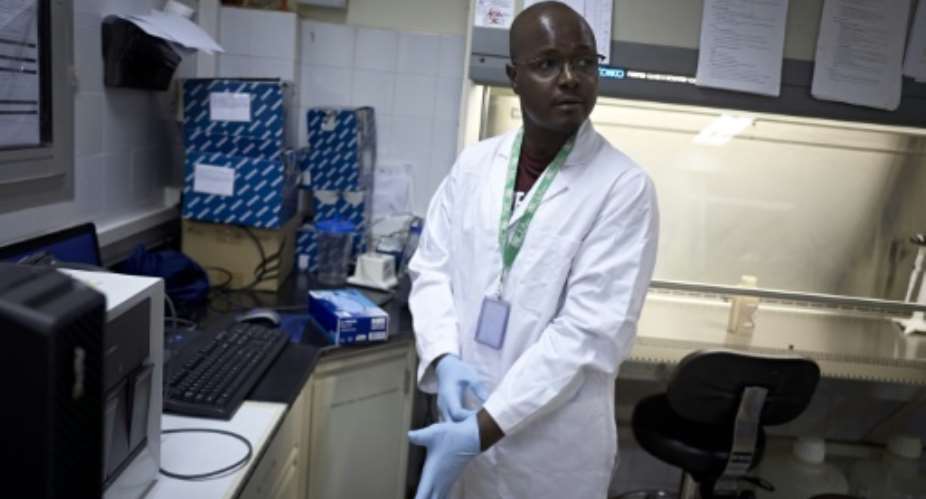Amadou Kone has thrown himself into two fights worthy of a titan -- easing Mali's deepening domestic crisis and braking the coronavirus pandemic.
In what could be a unique position for anyone in the world right now, the 38-year-old is running for a seat in parliamentary elections on Sunday while at the same time working gruelling hours as a virus researcher.
Kone is one of 13 scientists at work in Mali's only P3 laboratory -- a high-security facility where samples of the lethal virus are tested and studied. And once a week he teaches medical students.
"I get three hours of sleep a night at the moment, between the tests and the election campaigning," he said.
Kone and other like-minded citizens set up a small political party in 2014 called Republican Movement, which is pitching reforms for Mali's upcoming young generation.
In the evenings, he hangs up his lab coat and dons a purple suit to canvass voters in the Bamako's fifth electoral district.
"You do meet people, but numbers are restricted to fewer than 50 people, as the government has requested," he said.
Mali, an ethnically diverse country in the Sahel with a population of around 19 million, is one of the poorest countries in the world.
It is battling an Islamist insurgency that has claimed thousands of lives since 2012, and its healthcare system is desperately under-equipped for the feared onslaught of coronavirus.
The country has recorded two coronavirus cases to date -- two nationals who had recently arrived from France -- and President Ibrahim Boubacar Keita has introduced a range of restrictions, banning flights from virus-stricken countries and implementing a night-time curfew.
But the authorities have decided to push ahead with the vote to renew Mali's 147-seat National Assembly.
The elections have already been postponed several times, sapping public confidence in the political system. Staging the ballot was a key recommendation from crisis talks in December, which aimed at exploring non-military solutions to the country's crisis.
Asked whether, as a researcher, he supported postponing the elections once more because of the pandemic, as several opposition figures have suggested, Kone, said: "Perhaps we should have done, but I can understand why the government wants to keep them. And if they are going ahead, we can't stay on the sidelines!"
"We have to motivate people to go out to vote, it's important for the country," he said.
"Each time that these elections have been scheduled, they've been cancelled. This time they have to take place! Even with the coronavirus, when people go to the polling station, they will respect social distancing."
At a recent meet-the-people event in Bamako, Kone deftly switched from politician on the stump to virologist, explaining to his audience about the need to wash one's hands.
"I couldn't stop myself," he admitted afterwards. "We have to make people aware, it's vital. And if you can do it during a political rally, why not?"





 There’s nothing you can do for us; just give us electricity to save our collapsi...
There’s nothing you can do for us; just give us electricity to save our collapsi...
 Ghanaian media failing in watchdog duties — Sulemana Braimah
Ghanaian media failing in watchdog duties — Sulemana Braimah
 On any scale, Mahama can't match Bawumia — NPP Youth Organiser
On any scale, Mahama can't match Bawumia — NPP Youth Organiser
 Never tag me as an NPP pastor; I'm 'pained' the 'Akyem Mafia' are still in charg...
Never tag me as an NPP pastor; I'm 'pained' the 'Akyem Mafia' are still in charg...
 Your refusal to dedicate a project to Atta Mills means you never loved him — Kok...
Your refusal to dedicate a project to Atta Mills means you never loved him — Kok...
 2024 elections: I'm competent, not just a dreamer; vote for me — Alan
2024 elections: I'm competent, not just a dreamer; vote for me — Alan
 2024 elections: Forget NPP, NDC; I've the Holy Spirit backing me and nothing wil...
2024 elections: Forget NPP, NDC; I've the Holy Spirit backing me and nothing wil...
 2024 elections: We've no trust in judiciary; we'll ensure ballots are well secur...
2024 elections: We've no trust in judiciary; we'll ensure ballots are well secur...
 Performance tracker: Fire MCEs, DCEs who document Mahama's projects; they're not...
Performance tracker: Fire MCEs, DCEs who document Mahama's projects; they're not...
 Train crash: Railway ministry shares footage of incident
Train crash: Railway ministry shares footage of incident
